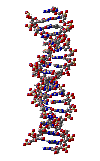|
Eight new genes linked to diabetes; the understanding of a financial and health monster (11/2003)
Eight genes, normally associated with normal pancreatic functions, are linked with susceptibility to diabetes Type 2 reports a team of investigators in the last issue of the PLoS Biology Journal 1.
Inês Barroso and colleagues at the University of Cambridge, United Kingdom studied 71 genes on more than 2000 individuals, trying to correlate gene variations with the appearance of metabolic changes characteristic of diabetes.
The team of investigators found evidence that 8 out of the 71 genes analysed were linked to susceptibility to diabetes Type 2, which supports the view that genetic predisposition to this disease does not originate from a few major genetic defects, but instead, from an accumulation of multiple small genetic variations.
This result confirms the genetic complexity behind Type 2 diabetes and emphasises the importance of large-scale studies like theirs, as one of the few ways to identify such a multitude of genes each with a weak effect, a situation that makes their identification problematic.
Diabetes is a chronic metabolic disease, which results from the inability of the body to properly use glucose, a sugar that is the cell’s main source of energy. Glucose when not converted into energy accumulates in the blood causing serious damage to the body tissues and organs. Insulin, a hormone produced in the pancreas by specialised cells called beta-cells (b-cells), regulates the level of glucose in the blood and problems with this hormone are associated with diabetes.
Diabetes can be classified into two main types: 1 and 2. Type 1 diabetes, also called "juvenile diabetes" or "insulin-dependent diabetes" is an autoimmune disease that develops when the insulin-producing b-cells have been destroyed and are no longer able to produce insulin/the hormone. Autoimmune diseases are diseases where the immune system attacks and destroys the body’s own tissues. In this case, the targets of the attack are b-cells.
Type 2, also called "adult onset diabetes" or "non-insulin dependent diabetes," is the most common kind with about 95% of the cases and affecting as much as 135 million people worldwide. This type of diabetes results from a combination of defects in both the production of insulin by b-cells and the body’s response to insulin, with tissues becoming resistant to the action of the hormone.
Very interestingly, InêsBarroso and colleagues report that in the group of genes they studied most of those associated with susceptibility to diabetes Type 2 are related to b-cells function and not with insulin function.
This, according to the authors, may suggest that the two dysfunctions behind diabetes Type 2 diabetes are differently affected by environmental and genetic factors, with insulin resistance being mainly induced by causes in the environment while problems with b-cells insulin secretion are mainly affected by genetic factors.
Environment and individual’s genetic background can both influence the appearance of diabetes Type 2. But while the influence of environmental factors, like obesity and life style, has been well documented the genetic components behind disease have proven more elusive. Barroso and colleagues’ results lead to a better understanding of the genetic element of diabetes Type 2.
In their work the team of investigators identify 8 new genes involved in diabetes Type 2. They also propose that the disease is not induced by major genetic defects but instead from multiple small-effect genetic changes. Both results confirm the idea that diabetes type 2 genetics is extremely complex.
Furthermore, Barroso and colleagues’ results suggest that the two main areas affected in diabetes Type 2, insulin secretion by b-cells and insulin action, are differently influenced by genetic and environmental factors. This is important, not only to the understanding of the mechanics behind disease, but also to get better disease prevention.
Type 2 Diabetes is a major world health problem with more than 100 million people affected worldwide. Obesity, lack of exercise and a diet of fast food are all factors of modern society predisposing to the present increase in the number of sufferers. The serious complications associated with it such as blindness, gangrene, kidney failure and other organ complications have made diabetes not only a health problem of great consequence but also a major financial burden to national health services all over the world.
Only by understanding the multiple factors behind the disease can we hope to achieve better treatments and a more effective prevention and that is what makes Barroso and colleagues’ work so important.

PLoS Biology Journal (2003) vol 1(1), p41-54
Original paper’s authors
Inês Barroso is a Portuguese scientist that who now works on the genetics of human type 2 diabetes and obesity at The Wellcome Trust Sanger Institute, Cambridge, United Kingdom
|
In collaboration with the Observatório da Ciência e do Ensino Superior (OCES)
Financed by the Fundação para a Ciência e Tecnologia (FCT) |





